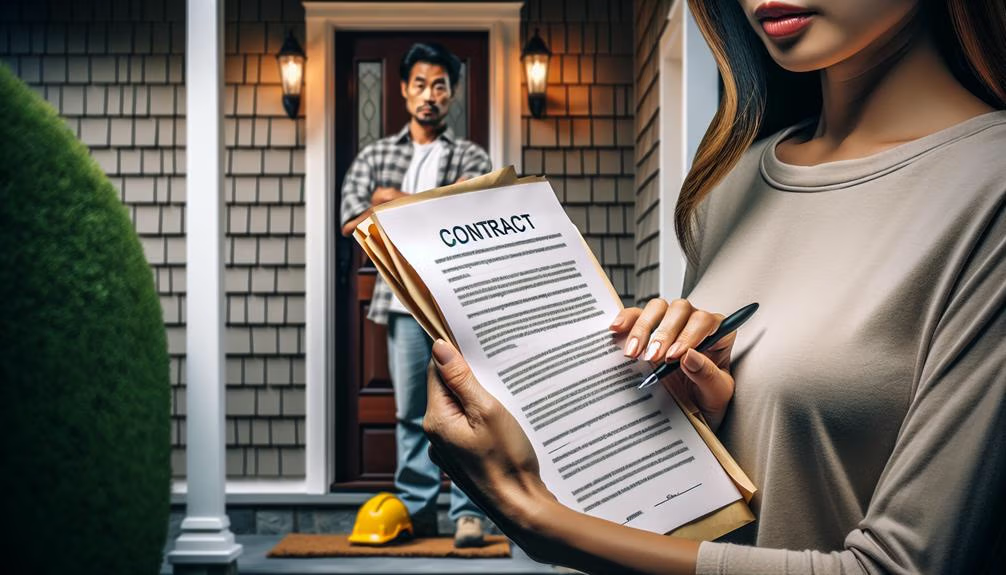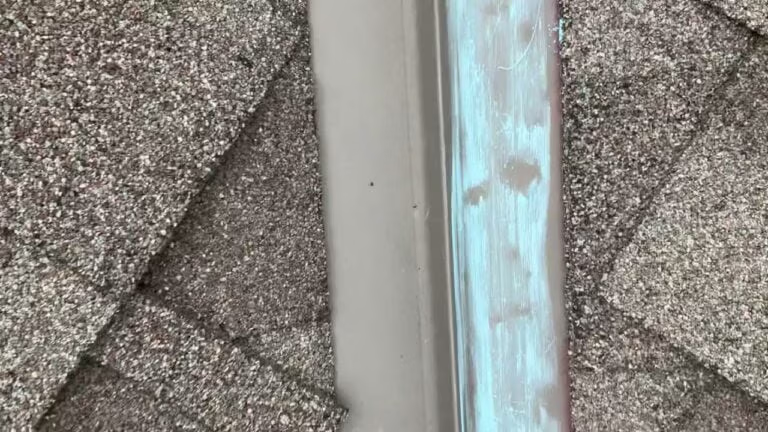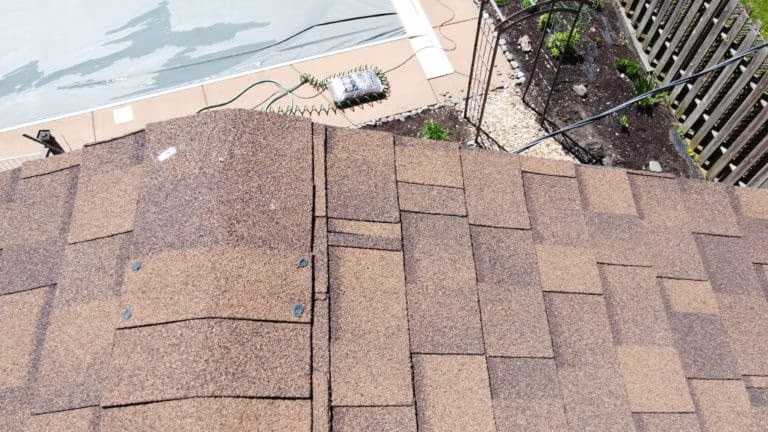Choosing the right roofing contractor is vital for a successful and durable roofing project. Start by verifying their licensing and insurance to avoid potential legal and financial headaches. A few years back, I learned the hard way how important it is to check references and online reviews; they can reveal the contractor's reliability and quality of work. Obtain multiple quotes to compare prices, materials, and timelines. Discuss project details and ensure comprehensive warranties. Clear communication is a must to ensure everyone is on the same page. Curious to find out more about securing the best roofing contractor?
Choosing the Right Roofing Contractor
- Verify the contractor's licensing, insurance, and accreditation to ensure compliance and protect against financial liabilities.
- Obtain multiple quotes to compare pricing, material options, and work timelines for the best value.
- Check references and online reviews to assess the contractor's reputation and past performance.
- Evaluate the contractor's experience and completed projects to gauge craftsmanship and reliability.
- Review contract terms, including payment schedules and warranties, to secure your investment and ensure clear expectations.
Verify Credentials

When selecting a roofing contractor, one of the most crucial steps is to verify their credentials to ensure they are licensed, insured, and accredited by relevant industry organizations. This verification process not only confirms the contractor's legitimacy but also provides peace of mind. Take, for instance, my neighbor who hired a contractor without checking his credentials. What seemed like a great deal initially turned into a costly nightmare when the roof started leaking after the first rain. The unlicensed contractor disappeared, leaving my neighbor with an expensive repair and no recourse.
Licensing is a fundamental indicator that a contractor meets state and local regulations. It assures homeowners that the contractor possesses the necessary knowledge and expertise to perform the job safely and correctly. Accreditation from reputable industry bodies like the Better Business Bureau or the National Roofing Contractors Association is another positive sign. These organizations enforce standards that their members must uphold, offering an additional layer of trust.
Check Insurance
Ensuring that your roofing contractor carries adequate insurance is crucial to protecting yourself from potential financial liabilities and unforeseen incidents. Imagine hiring a contractor without insurance, only to have a worker injure themselves on your property. Without the proper coverage, you might find yourself responsible for medical bills and compensation, which can be financially devastating.
When my neighbor, Laura, hired a roofing contractor a few years ago, she didn't think to check their insurance. Mid-project, a worker fell off the roof and suffered serious injuries. Laura was shocked to learn that the contractor wasn't insured, and she ended up facing a lawsuit that drained her savings. This heartbreaking experience underscores the importance of verifying insurance coverage.
Before signing any contracts, ask the roofing contractor for proof of both liability insurance and workers' compensation insurance. Liability insurance protects your property from any accidental damage during the project, while workers' compensation covers any injuries sustained by the workers. Don't just take their word for it; request to see the certificates and verify their validity with the insurance provider. Taking this step can save you from potential financial strain and give you peace of mind during your roofing project.
Get Multiple Quotes

Obtaining multiple quotes is crucial when selecting a roofing contractor to ensure you get the best value for your investment. By comparing price estimates, evaluating material options, and assessing work timelines, you can make a well-informed decision. This thorough approach not only protects your finances but also guarantees the quality and timeliness of the project.
Compare Price Estimates
Frequently, one of the most effective strategies for ensuring you get the best value for your roofing project is to obtain multiple quotes from different contractors. This approach allows you to compare not just prices, but also the scope of services, warranties, and materials offered. When my neighbor Jane needed a new roof, she initially felt overwhelmed by the numerous choices. However, once she gathered quotes from five different contractors, she found it easier to identify which one provided the best balance of cost and quality.
Comparing price estimates helps you understand the market rate for your project. Be wary of quotes that are unusually low; they might indicate subpar materials or workmanship. Conversely, the highest bid isn't always synonymous with superior quality. When I had my roof replaced last year, I noticed that the quotes varied widely. It was only by scrutinizing the details that I found a contractor who offered excellent quality at a reasonable price.
Evaluate Material Options
Understanding the variety of roofing materials available is just as important as comparing price estimates when selecting the right contractor. The materials you choose will significantly impact the durability, aesthetics, and overall cost of your roofing project. Each option comes with its own set of pros and cons, making it crucial to weigh these factors carefully.
Reflecting on my own experience, I remember feeling overwhelmed by the myriad of choices. It was then that I realized the importance of getting multiple quotes, not just for pricing, but also to understand the material options each contractor recommended. This approach allowed me to make an informed decision that met both my budget and my aesthetic preferences.
Here are some common roofing materials you might consider:
- Asphalt Shingles: Cost-effective and easy to install, but may have a shorter lifespan.
- Metal Roofing: Highly durable and energy-efficient, though typically more expensive upfront.
- Clay Tiles: Offers a classic look and excellent durability, but can be heavy and costly.
- Slate: Extremely long-lasting and aesthetically pleasing, but one of the most expensive options.
Assess Work Timelines
When selecting a roofing contractor, it is essential to compare work timelines by obtaining multiple quotes to ensure the project aligns with your schedule and expectations. Gathering several quotes not only helps gauge the average timeframe but also highlights any outliers—those who promise unrealistic deadlines or, conversely, take too long.
For instance, during my own roof replacement, I received quotes ranging from two weeks to over a month. This variance made me reconsider my initial choice and ultimately helped me choose a contractor who demonstrated both confidence and realistic planning. It's crucial to listen to your gut feeling and ask probing questions. How does the contractor handle unexpected weather conditions? What steps are in place to manage delays?
Ask for References
To ensure you choose a reputable roofing contractor, it is essential to ask for and check their references. This step cannot be overstated, as it provides a window into the contractor's past performance and customer satisfaction. My own experience with home renovations taught me the value of speaking directly with previous clients. When I needed a new roof, I contacted several references provided by the contractor, and their insights were invaluable.
Here are some points to consider when checking references:
- Quality of Work: Ask former clients about the quality and durability of the roofing work. Did it stand the test of time and weather?
- Professionalism: Inquire about the contractor's professionalism. Were they punctual, respectful, and transparent throughout the process?
- Problem Resolution: Find out how the contractor handled any issues or setbacks. Were they responsive and willing to make necessary adjustments?
- Overall Satisfaction: Finally, ask if they would hire the contractor again. This question often reveals their true level of satisfaction.
Seeking references is more than a formality; it's a chance to hear real stories from people who were once in your shoes. Make sure to take this step seriously to safeguard your investment and peace of mind.
Read Online Reviews

In addition to speaking with references, reading online reviews can provide a broader perspective on a roofing contractor's reputation and reliability. Online reviews offer insights from a diverse range of clients, helping you gauge the consistency of a contractor's performance and customer satisfaction.
Imagine this scenario: Sarah and John, a couple in their mid-40s, were searching for a roofing contractor to repair their aging roof. They found a contractor with excellent references. However, after reading numerous online reviews, they discovered several recurring complaints about delays and communication issues. This information prompted them to seek alternative options, ultimately leading them to a contractor with consistently positive reviews.
Online reviews can reveal patterns of behavior that might not be evident from a few references. Pay attention to common themes in the feedback, whether positive or negative. Look for mentions of punctuality, quality of work, professionalism, and customer service. Personal stories and detailed experiences shared by previous clients can provide valuable context and help you make a more informed decision.
Ultimately, online reviews are a powerful tool in your decision-making process, offering a comprehensive view of a contractor's track record and helping you avoid potential pitfalls.
Evaluate Experience
When selecting a roofing contractor, assessing their experience is crucial for ensuring quality workmanship. Reflect on how long they have been in business and consider the number of completed roofing projects they have under their belt. My neighbor, for instance, felt confident choosing a contractor with over 20 years of experience and countless successful projects, and now enjoys a sturdy, leak-free roof.
Years in Business
Evaluating a roofing contractor's years in business can provide valuable insight into their level of experience and reliability. Longevity in the industry often suggests a track record of satisfied clients and successful projects. When I was searching for a contractor for my own home, I found that those with more years in business often exuded a sense of confidence and trustworthiness.
Consider the following points when assessing a contractor's years in business:
- Stability and Reputation: A company that has been operating for many years likely has established a solid reputation in the community.
- Experience with Various Roofing Systems: Longevity often means exposure to various types of roofing materials and systems, enhancing their problem-solving skills and expertise.
- Financial Stability: Long-standing businesses are typically financially stable, reducing the risk of project interruptions due to financial issues.
- Customer Loyalty: A contractor who has been around for years likely has a loyal customer base, indicating trust and satisfaction.
Completed Roofing Projects
While years in business provide a solid foundation, the true measure of a roofing contractor's expertise lies in the quality and scope of their completed projects. Evaluating a contractor's past work offers invaluable insights into their craftsmanship, reliability, and attention to detail. It's one thing to have years of experience, but delivering consistently high-quality results is what truly sets top contractors apart.
Consider asking to see a portfolio of their completed projects. Look for diversity in the types of roofing systems they've installed and note any recurring issues or complaints in customer reviews. For example, a friend of mine recently hired a contractor with glowing reviews and an impressive portfolio. The contractor's previous work showcased not only technical skill but also a commitment to aesthetic appeal and durability.
Don't hesitate to request references from previous clients. Personal anecdotes from homeowners can provide a real-world perspective on what it's like to work with the contractor. In my experience, those who go above and beyond in their past projects are more likely to exceed your expectations. Remember, a well-completed roofing project is not just about functionality; it's about creating peace of mind and lasting value for your home.
Discuss Project Timeline

To ensure a smooth and timely completion of your roofing project, it's essential to establish a clear project timeline with your contractor. A defined timeline not only sets expectations but also helps in managing resources and minimizing disruptions to your daily life. When my family had our roof replaced, we learned how crucial it was to discuss every phase of the project beforehand.
Here are some critical points to cover when discussing the project timeline:
- Start and End Dates: Specify when the project will commence and when it is expected to be completed. This helps in planning your schedule around the construction work.
- Milestones: Break down the project into key phases, such as removal of old roofing, installation of the new roof, and final inspections. This ensures that you and the contractor are aligned on progress.
- Weather Contingencies: Discuss how weather conditions might affect the timeline and what measures will be taken to address any delays.
- Communication Protocols: Establish how and when you will receive updates on the project's progress, ensuring constant and clear communication.
Understand Warranties
Understanding the warranties offered by your roofing contractor is crucial for ensuring long-term peace of mind and protection for your investment. When my own roof needed replacement last year, I learned firsthand how significant a solid warranty can be. A robust warranty can save you from future headaches and unexpected costs.
There are generally two types of warranties to consider: the manufacturer's warranty and the contractor's workmanship warranty. The manufacturer's warranty covers defects in the roofing materials, while the workmanship warranty covers installation errors. A reputable contractor should offer both. When I hired my contractor, I made sure they provided a comprehensive workmanship warranty, which paid off when minor issues arose a few months later. The contractor promptly addressed the problems at no additional cost.
Ensure you understand the duration and coverage details of each warranty. Ask specific questions about what is included and any exclusions or limitations. This will help you avoid any surprises down the road. Remember, a warranty is only as good as the company behind it. Choose a contractor with a proven track record and read reviews from previous customers to gauge their reliability in honoring warranties.
Review Contract Terms

Reviewing the contract terms is crucial to ensure there are no surprises during your roofing project. Pay close attention to the payment schedule details and make sure they align with your budget and expectations. Additionally, verify the warranty and guarantees provided to protect your investment and secure peace of mind.
Payment Schedule Details
A clear and detailed payment schedule is essential to ensure both parties understand their financial obligations and project milestones. When selecting a roofing contractor, scrutinize the payment terms in the contract to avoid any misunderstandings or disputes. I recall a personal experience where I was caught off-guard by unexpected payment demands mid-project. This taught me the importance of a well-defined payment structure.
Key components of a payment schedule to review include:
- Initial Deposit: The percentage required upfront should be reasonable, typically no more than 20-30% of the total cost.
- Milestone Payments: Payments tied to specific project milestones, such as material delivery or completion of certain phases.
- Final Payment: The remaining balance should be due only after the project is completed to your satisfaction.
- Payment Methods: Clarify acceptable forms of payment, whether it be cash, check, or credit.
Understanding and agreeing upon these details can prevent financial strain and build trust between you and the contractor. If any terms seem unclear or unreasonable, don't hesitate to discuss them. Transparency is a cornerstone of a successful roofing project, ensuring a smoother, stress-free experience.
Warranty and Guarantees
As you finalize the payment schedule, it's equally important to scrutinize the warranty and guarantees outlined in the contract to safeguard your investment. A roofing project is no small undertaking, and ensuring that the contractor stands behind their work can provide peace of mind. When I had my roof replaced last year, the warranty details were a deciding factor. A contractor offering a comprehensive warranty not only signifies confidence in their craftsmanship but also provides a safety net for unexpected issues.
There are typically two types of warranties to consider: manufacturer's warranties and workmanship guarantees. Manufacturer's warranties usually cover defects in roofing materials, while workmanship guarantees address installation errors. It's crucial to read the fine print—length of coverage, what's included, and any conditions that might void the warranty. I remember vividly how relieved I felt knowing that both material and labor were covered for a significant period.
Moreover, always ask the contractor to clearly explain these terms. A reputable contractor will be transparent and willing to answer all your questions. This diligence ensures you won't face unanticipated costs down the road, allowing you to enjoy your new roof with confidence.
Assess Communication Skills
Effective communication is a critical factor to consider when selecting a roofing contractor, as it ensures that expectations are clearly set and met throughout the project. In my experience, the ability to freely discuss project details, timelines, and potential issues with your contractor can make the difference between a smooth process and a stressful ordeal. Clear communication builds trust and helps you feel confident that your vision will be realized.
When assessing a contractor's communication skills, consider the following:
- Responsiveness: Does the contractor reply promptly to your calls, emails, or texts? Timely responses indicate that they value your time and are committed to your project.
- Clarity: Are the contractor's explanations clear and easy to understand? This ensures that you are fully informed about the project's progress and any challenges that may arise.
- Listening Skills: Does the contractor actively listen to your concerns and preferences? Effective listening is key to tailoring the project to meet your specific needs.
- Professionalism: How does the contractor handle questions and concerns? Professional demeanor and respectful interactions are essential for a positive working relationship.
Frequently Asked Questions
How Do I Handle Unexpected Repairs During the Roofing Project?
Handling unexpected repairs during a roofing project requires clear communication with your contractor. Establish a contingency plan and budget beforehand to accommodate unforeseen issues. Regularly review progress and address any surprises promptly. Ensure all changes are documented, and obtain written estimates for additional work. This proactive approach will help manage costs and timelines effectively, ensuring the project stays on track despite unexpected challenges.
What Are the Most Durable Roofing Materials Available?
Imagine your roof as a knight's shield, protecting your home from nature's onslaught. Among the most durable materials, slate stands as the steadfast warrior, offering unparalleled longevity. Metal, like a disciplined sentinel, resists corrosion and harsh weather. Clay tiles, reminiscent of ancient fortresses, provide enduring strength and resilience. Each material, chosen wisely, ensures your home remains a bastion of safety for years to come.
How Can I Ensure Proper Ventilation in My Roof?
Ensuring proper roof ventilation involves installing both intake and exhaust vents to promote airflow. Intake vents, typically located in the eaves or soffits, allow cool air to enter, while exhaust vents, often placed at the ridge or high points, enable hot air to escape. Adequate ventilation prevents moisture buildup, reduces energy costs, and prolongs the lifespan of roofing materials. Consulting with a roofing professional ensures optimal vent placement and efficiency.
Are There Eco-Friendly Roofing Options?
Yes, there are several eco-friendly roofing options available. Materials like recycled metal, clay tiles, and sustainably sourced wood shingles contribute to environmental conservation. Additionally, green roofs with vegetation can improve insulation and reduce urban heat effects. Solar panels integrated into roofing systems provide renewable energy, further minimizing environmental impact. These options not only enhance sustainability but can also offer long-term cost savings through energy efficiency.
What Maintenance Is Required After the Roofing Job Is Completed?
After the roofing job is completed, maintenance is key to ensuring your roof lasts a lifetime, defying the laws of nature. Regular inspections, especially after severe weather, can catch minor issues before they become major headaches. Cleaning gutters, removing debris, and checking for leaks are essential tasks. Personal experience has shown that consistent upkeep not only protects your home but also provides peace of mind, knowing your investment is secure.
Conclusion
In selecting a roofing contractor, it is crucial to verify credentials, check insurance, obtain multiple quotes, ask for references, read online reviews, discuss the project timeline, understand warranties, review contract terms, and assess communication skills. Notably, a report from the Better Business Bureau indicates that over 70% of consumer complaints about roofing contractors are due to poor workmanship or failure to complete the job. This underscores the importance of thorough vetting to ensure a successful roofing project.





